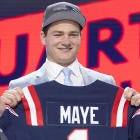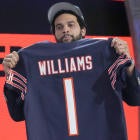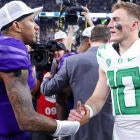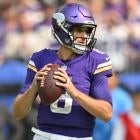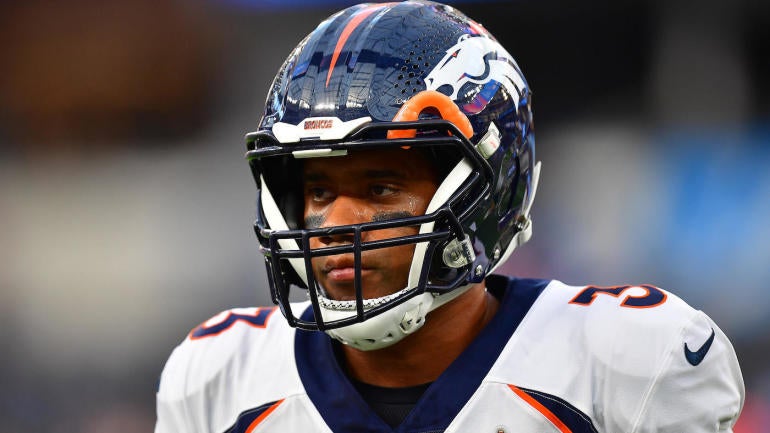
If anyone needed confirmation that the Broncos' blockbuster offseason gambles have not paid off, the team provided it this week, firing coach Nathaniel Hackett just 15 games into his first season. Now, there remains one other elephant in the room: quarterback Russell Wilson. The longtime Seahawks star arrived with much fanfare, acquired in exchange for a massive trade package and inked to a $245 million extension before taking his first snap in orange. But Wilson, like Hackett, has been instrumental in Denver's dysfunctional 2022 performance, leading to questions about his own future with the team.
Fully diagnosing, let alone correcting, Wilson's plummet under center is hard enough. Long one of the NFL's standard-bearers when it comes to poise, pocket awareness and downfield passing, the QB has endured easily the worst season of his career at 34, barely completing 60 percent of his throws while totaling just 12 touchdowns and nine interceptions during a 3-10 stretch as the starter. Hackett's decision-making, plus a banged-up supporting cast, surely contributed to Wilson's drop-off. But there are larger concerns at work here, namely Wilson's apparent decline in mobility, which once enabled him to extend plays with ease; and an even more apparent insistence on quick-strike Shotgun passing, which has never been his bread and butter.
It's become increasingly clear that Wilson both wants and needs to be a QB that he's never truly been, at least up to this point: he wants to be the ultra-efficient superstar whose legacy and trophy case improve with age, and he needs to be ultra-efficient to compensate for less trademark elusiveness and off-script athleticism. Figuring out how to strike a happy medium, and ironically revert Wilson to the Seahawks-level production he sought to escape, will be the next Broncos coach's top task.
Or will it? Is there actually a scenario where Denver could cut the cord on this marriage after just one season?
If general manager George Paton sticks around, as the Broncos indicated in their dismissal of Hackett, it may be less likely. Paton, after all, is the one who swung for the fences to land Wilson, parting with three players and five draft picks, including two first-rounders, to do so. He's the one who gave Wilson a five-year, $245M extension, with $124M guaranteed, on Sept. 1, without ever seeing the QB play a Broncos game that counted. While Wilson's steadily sluggish debut should give new team ownership plenty of pause about the short- and long-term prospects of their team, the QB's results can't be fully separated from the price paid to get them. This is a business. And there is no easy way for Denver to turn this into a profit.

CBS Sports HQ Newsletter
Your Ultimate Guide to Every Day in Sports
We bring sports news that matters to your inbox, to help you stay informed and get a winning edge.
Thanks for signing up!
Keep an eye on your inbox.
Sorry!
There was an error processing your subscription.
A standard release of Wilson following this season is practically impossible. This would result in an astronomical $107M dead-cap charge and, more importantly, an immediate net loss of $85M, per Over The Cap. The Broncos would literally need to cut almost half their team to stay under the 2023 salary cap. There are multiple ways Denver could reduce immediate losses by designating Wilson a post-June 1 release, however. One scenario has the Broncos absorbing a $61M dead-cap hit in 2023.
Another, the best-case scenario for cutting Wilson, involves converting 2023 salary to a bonus, exercising an option in the QB's deal, then designating him a post-June 1 release to take roughly a $40M dead-cap hit in 2023, and $67M dead-cap hit in 2024. This would make Wilson's dead-cap hit comparable to that of Matt Ryan, whose trade to the Colts last offseason left the Falcons paying a record $40.5M for the QB to play elsewhere. This would not immediately save the Broncos any money; in fact, it would still result in a net loss of about $17M in 2023. But if team brass, and/or the next coach, truly believes Wilson is unsalvageable, the name of the game may well be admitting the mistake, taking the financial lumps, and trudging forward.
It's very possible the Broncos would wait to decide on a post-June 1 release of Wilson until after June 1. Players can be cut earlier with the designation, but in this case, the new ownership and coaching regime might prefer to spend January-May exploring every alternative: rebuilding the offense for Russ, evaluating free agent and rookie QBs, praying for another desperate team to call about a trade. If they ultimately determine Wilson must go, swallowing a $17M loss via post-June 1 release, it's conceivable that other veterans will become cap casualties or trade/restructure candidates, including wide receiver Courtland Sutton, left tackle Garett Bolles, linebacker Randy Gregory, cornerback Ronald Darby and safety Justin Simmons.
The absolute dream scenario for the Broncos is another team pursuing Wilson via trade. A post-June 1 trade would instantly save Denver $8M, not to mention free up money down the road. But who's gonna be jumping at the chance to absorb such an expensive deal for potentially damaged goods? It's true that legitimate suitors will likely be hard to come by. But never say never in the NFL, especially a year after the Colts basically advertised their divorce from Carson Wentz and still netted a third-round draft pick via trade, and a year after the Browns willingly surrendered three first-rounders, plus $230M guaranteed, for a QB in Deshaun Watson who hadn't played in more than a year and faced an inevitable suspension.
Paton is most likely to give Wilson another year under a fresh staff, then address the fork in the road in 2024, when the QB can be cut as a post-June 1 release with no financial penalty other than the dead-cap hit. But he, or whomever is actually calling the shots under new ownership, will almost assuredly listen to any calls that come in before then. Not only that, but the Broncos would probably even offer to eat some of the QB's salary to facilitate a deal, a la the Browns' trade of Baker Mayfield to the Panthers this summer.
And if you can't fathom the idea of someone dialing Denver to discuss Russ, just remember we're only a year removed from other teams reportedly matching the Broncos' offer of multiple first-rounders to acquire him. Hackett's firing at least hints to the outside world that Wilson's bad debut was a result of a poor setup. And the QB is 34, not 38, in a league where at least 10-12 teams are perpetually eyeing an upgrade at the position.
On that off chance, then, which teams might actually consider working with the Broncos to take on Wilson and his deal? Consider these four: the Falcons, Giants, Patriots and Raiders.
Atlanta is loaded with 2023 cap space (projected $70M), has no discernible future at QB after benching Marcus Mariota for Desmond Ridder, and is entering year three of the Arthur Smith system, which prides itself on the run-heavy approach that once complemented Wilson, and previously revived Ryan Tannehill in Tennessee. New York is also chock-full of 2023 cap space ($59M), has proven competitive leaning on the run, boasts a coach in Brian Daboll who's now elevated both Josh Allen and Daniel Jones, and offers the big market Wilson may still covet. The Giants, meanwhile, reportedly inquired about Wilson before his move to Denver, suggesting they've already done some homework on how to utilize him post-Seattle.
Like the others, the Patriots are set to be flush with cash ($55M), and Mac Jones hasn't exactly inspired confidence in their new offense. Bill Belichick is more inclined than most to take a flyer on a star castoff, and his old-school approach could be the right recipe for a Wilson rejuvenation; the QB's personality feels like a natural fit for the stoic Patriot Way, and Wilson might relish in the opportunity to follow in Tom Brady's footsteps in New England. Lastly, the Raiders can easily cut Derek Carr, whose debut under Josh McDaniels has been especially mercurial, to save close to $30M, and Wilson previously identified Las Vegas as one of his preferred landing spots. Intra-division trades of this sort are rare but not unprecedented, especially when the selling team is that motivated to dump money.
Barring a stunning redemption tour from Wilson in 2023 and beyond, the Broncos don't have many clear paths to victory here. But the way 2022 unfolded, they'd surely settle for a tie.














